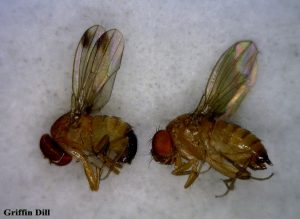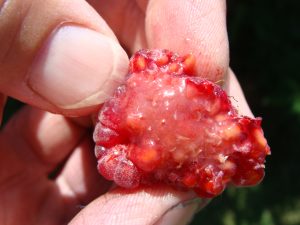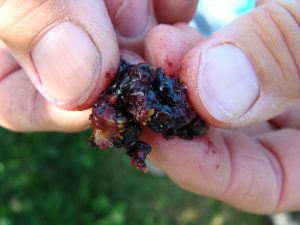Spotted Wing Drosophila Alert: 9/24/2021
Spotted Wing Drosophila Alert: 9/24/2021
David Handley, Vegetable and Small Fruit Specialist; James Dill, Pest Management Specialist, Phil Fanning, Assistant Professor of Agricultural Entomology, Christina Howard, Produce Safety Professional

Spotted wing drosophila catches in vinegar/yeast traps have increased in most locations, with most containing fly counts in the thousands, despite regular insecticide applications. Some of this increase may be due, not only to more flies present in the fields, but also a lack of food, as harvest in some fields begins to wind down. We have found that as availability of food decreases in a field, the bait in our traps becomes more attractive to the flies and thus counts start to go up. Once the food supply is depleted, counts will finally start to go down. At present population levels, larvae will infest any unprotected berries still in the field. Regular sprays continue to be needed to prevent fruit from becoming infested. A three to five-day spray schedule should be adequate. Rotate the insecticide products (IRAC number) used to maintain long term effectiveness.

Keep fields as free as possible from over ripe fruit and waste fruit on the ground to help reduce fly numbers. Harvest fruit regularly and often, and chill any fruit that is going to market down to 32-38 degrees Fahrenheit, to stop the development of any eggs or larvae that may be present.

For more information on identifying spotted wing drosophila (SWD) and updates on populations around the state, visit our SWD blog
Other IPM Web Pages
Michigan State University
David T. Handley
Vegetable and Small Fruit Specialist
Highmoor Farm Pest Management Unit
P.O. Box 179 17 Godfrey Dr.
Monmouth, ME 04259 Orono, ME 04473
207.933.2100 1.800.287.0279
Where brand names or company names are used it is for the reader’s information. No endorsement is implied nor is any discrimination intended against other products with similar ingredients. Always consult product labels for rates, application instructions and safety precautions. Users of these products assume all associated risks.
The University of Maine is an equal opportunity/affirmative action institution.
| Town | Spotted Wing Drosophila weekly trap catch 9/5/21 | Spotted Wing Drosophila weekly trap catch 9/12/21 | Spotted Wing Drosophila weekly trap catch 9/19/21 |
|---|---|---|---|
| Wells | 1,864 | 1,264 | 4,560 |
| Limington | 2,504 | 3,440 | 3,984 |
| Limerick | 115 | 219 | 2,232 |
| New Gloucester | 224 | 371 | 2,440 |
| Bowdoinham | 6,320 | 5,952 | 3,336 |
| Mechanic Falls | 154 | 236 | 208 |
| Monmouth | 11,328** | 13,040** | 5,336 |
| Wayne | 85* | 5,482 | 7,392 |
*Trap damaged; limited data
**Unsprayed plot
| Trade Name | IRAC Group | Days to Harvest Blueberry |
Days of Residual |
|---|---|---|---|
| Assail® | 4A | 1 | 5-7 |
| Mustang Max® | 3 | 1 | 7 |
| Bifenture® | 3 | 1 (3 raspberry) | 7 |
| Brigade® | 3 | 1 (3 raspberry) | 7 |
| Danitol® | 3 | 3 | 7 |
| Delegate® | 5 | 3 (1 raspberry) | 7 |
| Entrust®* | 5 | 3 (1 raspberry) | 3-5 |
| Exirel® | 28 | 3 (1 raspberry) | 5-7 |
| Imidan® | 1B | 3 (not for raspberry) | 5-7 |
| Malathion | 1B | 1 | 3-5 |
| PyGanic®* | 3A | 0 | 0 |
| Verdepryn ® | 28 | 1 | 5-7 |
*OMRI approved
